The poll tax, officially called the community charge, was seen as Mrs Thatcher’s biggest policy bungle during 11 years in power.
It triggered riots and led to her leaving Downing Street in tears after being dumped as Tory leader in 1990.
Early the previous year, local authorities in England and Wales began issuing poll tax registration forms.
One form covering 10 Downing Street, which Mrs Thatcher and her husband Denis had nominated as their main home, was sent to the Treasury.
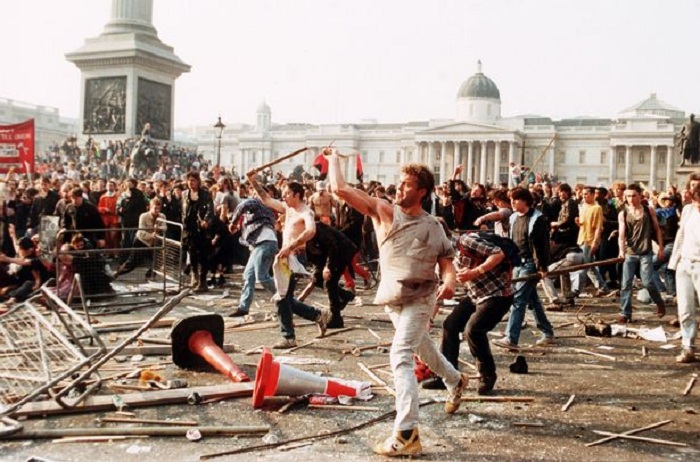
The poll tax riots of 1990 shocked Thatcher and brought about her demise
But the Cabinet Office complained that it was “most inappropriate” to issue a single form “asking a number of essentially personal questions” on behalf of individual occupants.
Separate forms were sent out, but when there were still no details forthcoming, the Westminster City Council registration officer, David Hopkins, warned he would be forced to act.
In a letter dated May 22, 1989, he wrote: “My records show that the Community Charge Registration form recently sent to you has not been returned.
“I wish to advise that you are required by law to supply the relevant information within 21 days of this request and failure to do so may lead to a penalty being imposed.”
Panicking officials quickly arranged for Mrs Thatcher to complete the form, only to discover the council had sent the wrong one and she had to do it all again.
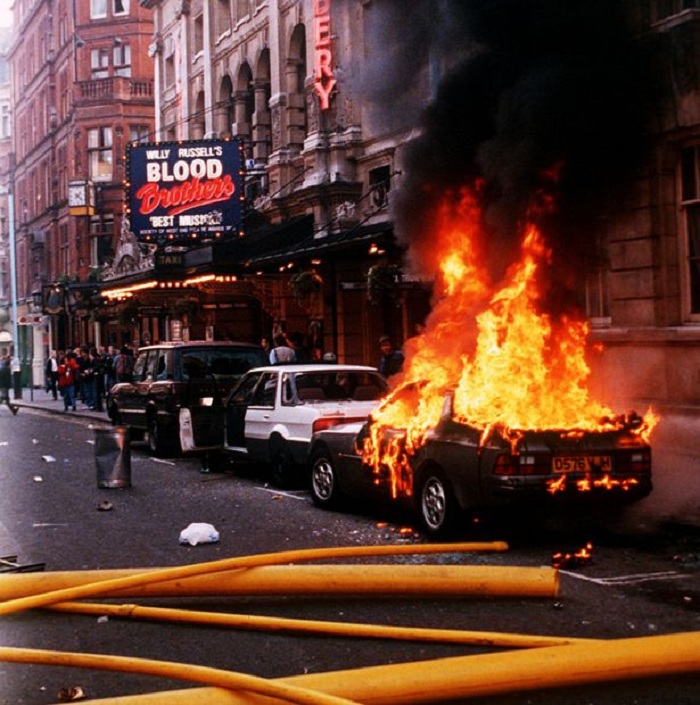
Cynical Thatcher had hoped councils would be blamed for the tax, instead of central government
The arrogant premier chose to shrug off the bureaucratic blow, claiming her first effort had been “a good practice run”.
The poll tax was brought in to replace the old system of rates, based on property values, with a flat-rate levy on all residents.
Mrs Thatcher hoped voters facing much higher bills would blame Labour councils who tended to spend more on providing services. But her cynical ploy backfired.
When poll tax demands started dropping through letterboxes across the country – including in many traditional Tory areas – central government came under fire. There was a wave of protests.
The shocked PM was left bewildered by the reaction, according to papers released by the National Archives in Kew.
In March 1990 she told Chancellor John Major she had always assumed the public would blame councils for any rises.
“But in recent weeks that has not happened,” she moaned. “Rather the general public blamed the high levels of community charge on the government because of their responsibility for introducing the new system.”

How the Daily Mirror reported the Tory revolt
She admitted that, with those on low incomes protected through “safety net” measures, it was the “conscientious middle” – traditionally her strongest supporters – who were being hit hardest.
Mrs Thatcher ordered a “rapid review” of possible changes for the following year, but the political damage had been done.
On March 31, 1990 – days before the tax was due to come into effect – a mass march through central London unleashed some of the worst rioting in the capital for decades. Trafalgar Square became a battle zone with mounted police clashing with furious protesters.
Metropolitan Police commissioner Sir Peter Imbert told the Prime Minister some of his officers “came close to being murdered”.
It was Mrs Thatcher, however, who was fatally damaged politically.
By the end of the year her Cabinet colleagues had knifed her and she was out of office. The downfall of the seemingly indestructible Iron Lady was met with disbelief by fellow world leaders.
Henry Kissinger, former US secretary of state, was in a “very emotional state”. In a note to Mrs Thatcher, foreign policy adviser Charles Powell said Mr Kissinger had told him: “It was worse than a death in the family.”
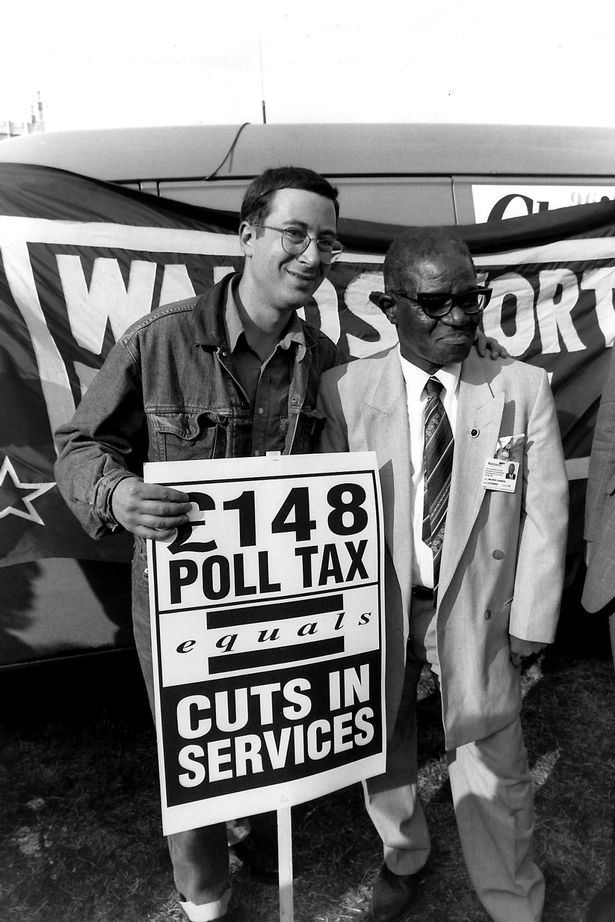
Comedian Ben Elton at a poll tax protest
The National Archive documents released today also feature letters between Mrs Thatcher and Princess Margaret, the Queen’s late sister.
Writing about a hospital stay in 1980, the royal told Mrs Thatcher: “I just had to have some things dug out of my face but luckily everything went well.”
The Princess also detailed a visit to Cambridge University for a debate, saying it was “rather dull, all about the church, lots of clerics”. All the guests were “rabid conservatives – not a Trotskyite to argue with!”
Acid test for rave culture
Acid house parties were deemed serious enough in Downing Street for a major crackdown – but barn dances were to be preserved.
With all-night raves angering residents in the 1980s, the Prime Minister demanded action to stop them spreading.

Thatcher wanted the acid house scene shut down
Asked if the Home Office should provide a briefing on the powers police had to control the parties, Mrs Thatcher replied: “Yes if this is a new ‘fashion’ we must be prepared for it and preferably prevent such things from starting.”
But Scotland Secretary Malcolm Rifkind warned tough new laws could accidentally target “innocent events” like barn dances, Cabinet Office papers reveal.
Milk snatcher lost her bottle
Almost two decades after she scrapped free school milk for over-sevens, Margaret Thatcher still recoiled at the storm it caused.
Despite the then Education Secretary’s plan sparking fury when it was proposed, it came into force in 1971 – and prompted the taunt “Thatcher, Thatcher, milk snatcher”.

Thatcher was scarred over the storm caused by her scrapping free milk for schoolchildren
National Archives files show she was horrified when colleague Ken Clarke also proposed ending free milk for nursery school kids. Mrs Thatcher scrawled a note, saying: “No – this will cause a terrible row – all for £4million. I know – I went through it 19 years ago.”
She was also appalled when, six years after the Falklands War, Foreign Secretary Geoffrey Howe suggested he should make a courtesy call on Argentina’s foreign minister who had been elected president of the UN General Assembly.
Drug-eating pests and cannabis `given to babies`
Secret plans to sabotage cocaine production abroad by introducing plant-destroying pests were described by Mrs Thatcher as being “characteristically brilliant” when the Government discussed waging war on drugs in 1989, the files reveal. Mrs Thatcher described the idea, proposed by Lord Rothschild in July 1989, as a “characteristically brilliant” and “intriguing”.
Lord Rothschild suggested using “covert” tactics and aerial sprays to introduce a bug which would attack the source of cocaine.
“Supposing it is possible that such a pest exists or that it is possible to ‘make’ one, the question arises as to how to introduce it into the relevant parts of the various countries involved,” he wrote in a letter to the PM.
Home Secretary Douglas Hurd suggested a “two-pronged” drug campaign and recruiting community figures to assist efforts among the Afro-Caribbean population.
But Carolyn Sinclair, of the Government’s policy unit, said the plans would need “delicately handling”.
“Afro-Caribbeans rarely take ‘hard’ drugs such as heroin, but regard cannabis as part of life. It is given to babies,” she wrote.
“The fact that cannabis is illegal is widely regarded as unjust. Most Afro-Caribbeans do not think that they, as a group, have a drug problem.”
/Mirror.co.uk/








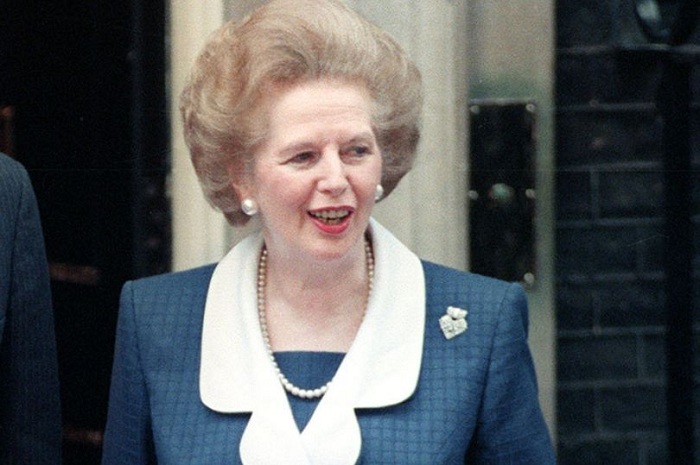






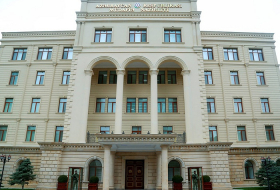
-1747837442.jpg&h=190&w=280&zc=1&q=100)































